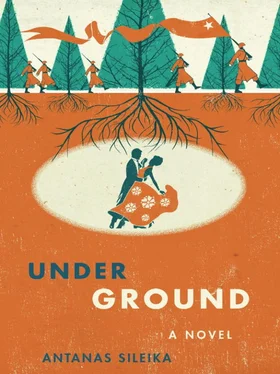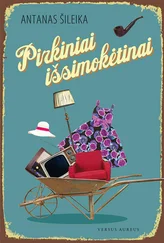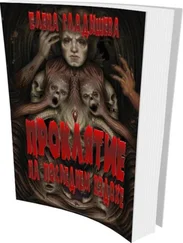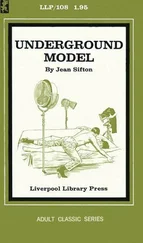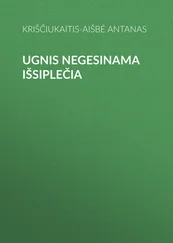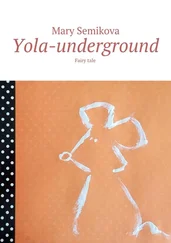Imbrasas’s face twisted in pain and fury and he reached for his throat to staunch the blood, and Almis grabbed the man’s head and pressed his face onto the hot pan, where his cheek sputtered in the grease. Imbrasas screamed, but rather than inciting Almis’s pity, the cries excited his anger. He lifted Imbrasas’s head by the hair, pulled the pan off the stove and, lifting the stove lid to expose the burning wood beneath, pushed Imbrasas’s face into the fire. Imbrasas was down on his knees in a moment, flailing.
“Don’t shoot or the soldier outside will hear the gunfire,” said Lakstingala.
Lukas took the frying pan from the floor and banged it hard against Imbrasas’s head, which was sandwiched between the frying pan and the metal stove. Imbrasas slumped, and Almis released him to fall onto the floor. The room smelled of singed meat and hair.
Almis turned to Lukas and Lakstingala. “Get the other one in the car outside.”
Lakstingala nodded and the two men went out.
The soldier in the car had not heard anything from within the house, but he saw them coming and tried to get out of the car to free his rifle. They shot him through the door and the window before he could escape.
Daylight was fading, and no one would come out looking for the dead men that night. Lukas and Lakstingala dragged out Imbrasas’s body, fired a few rounds into his neck to make it seem that bullets had killed him, and then put both bodies in the back seat of the car.
“Let us rest for a couple of hours,” said Lakstingala, “and then we’ll drive far away with the bodies. No one will even know they were here. The rain will wash the tracks away from the lane.”
“But what if he told someone where he was going?” asked Vida. She would not let go of the baby. It had been swaddled and had made no direct contact with the frying pan, though the edges of the cloth had been singed, but she had unwound the cloth and swaddled it anew. The baby was strangely quiet now. Vida, on the other hand, was not calm.
“It’s unlikely he told anyone he was coming here, but even if he did, we’ll drive the car back in the direction he came from for a few kilometres and then set it on fire in the forest. It will look like they were ambushed before they got here. If you’re lucky no one will even ask you about them.”
“But what if they do?” She turned to her husband. “You’ll go to the district committee this week and you’ll sign up to join the collective farm.”
“My father left this farm to me,” said Almis. “I can’t just give it away.”
“You can and you will. Your father would prefer you alive rather than dead.” She turned to Lakstingala. “It hurts me to say this, cousin, but I don’t want to see you at our door anymore. One of these days they’ll make us talk somehow, and I’d rather not be the one who has to give you up to the Cheka.”
“These are the men who saved us!” said Almis. “What about the soldier back in the car? What would we have done about him?”
“I could have killed him myself. In any case, it doesn’t matter. The regime wants us to give up our land. We’ll do that, and we’ll be safe for a while. We’ll keep our heads down and wait for better times.”
The partisans dried out their clothes as best they could in two hours. Almis scrubbed the floor where Imbrasas had spilled his blood. Then he packaged up the bread and meat that he had portioned out for the dead man. Lakstingala and Lukas took one half-bottle of liquor against the cold, as the rain had not let up outside. Vida went into the next room and did not come out again, even after the men slept for two hours and then rose to take away the car and the bodies.
Almis walked them out sheepishly into the yard. “I’m sorry for what she said.”
“It’s all right,” Lakstingala replied. “But try to keep the spirit of resistance in you even if you do join the collective farm. No one owns your spirit if you don’t let them.”
“No, but they do put your spirit on a grindstone here. They begin to wear it away.”
WINTER – SPRING 1950
THE REDS IN EASTERN EUROPE were like dike builders, damming up their positions to keep out the news from the West. But they could not prevent seepage from the BBC, from Sweden and even from Poland, a friend whose censorship was not all it could be.
Even within the country, underground news found its own way of flowing, persistent as water, running through the crevices and the cracks, pooling in the low places and building pressure until it burst through to the surface. Sooner or later everyone learned the same thing: the Cheka, the partisans and the farmers all heard that Lukas had done the impossible, had come into the country again.
The Cheka was eager, bordering on hysterical, to seize him, to redirect him to its own purposes. Best of all would be to get him alive in order to send disinformation out to the West, or to make him into a smiter himself, or at the very least to sound the depths of his knowledge. It would be terrible to have to kill him, but better to have him dead than running around the country like some kind of folk hero.
And to the folk he did remain a hero, a kind of invisible man who crossed borders as if they had no meaning, who evaded smiters and slew the slayers and left their bodies in cars that had been riddled with bullet holes.
And yet, for all his renown, the limits of his life were once again the damp walls of a bunker in his old partisan district, a pitifully small burrow with barely enough room for four men, and another bunker a kilometre away with room for two, a kind of citadel in case the first bunker was betrayed. Here he waited as Lakstingala sought contact along the tattered web of remaining partisans, trying to find news that would lead Lukas to Lozorius and through him to Elena.
“I’d like to go with you,” said Lukas.
“And so would the Cheka—that way you’d be easier to catch. No, no, you sit tight. The fact that you’re here at all is some kind of miracle.”
“But what if something happens to you?”
“If I’m ever gone more than a week, find a new place to live. Sniff around the town of Perloja for a partisan named Hawk. I think he’s still around.”
“I’d heard he died years ago.”
“That’s not what I heard. You never know.”
“I came to look for Elena.”
“The way to her is through Lozorius. Nobody I know can find her and I don’t want to stir up a hornet’s nest by asking too broadly or too quickly.”
“I love her.”
Lakstingala winced. “I have a wife too. Have you ever heard me talk like that about her?”
“No.”
“Exactly.”
“So tell me about her. What is she like? How has she managed all these years when the Cheka must know who you are by now?”
“I think something must have happened to you out there in the West. You’re not the same anymore. As our world gets more dangerous, you want to share more information. What’s going to happen if one of us gets taken alive? Do you think you’ll be able to stay silent under torture?”
“I don’t know.”
“Exactly. So the less you know about me, the better. It’s bad enough I let slip that she existed at all.” Lakstingala looked away, and then took out a pouch and rolled himself a cigarette. He lit it and took a couple of puffs and then studied the ember. “As for love, you’re not the only human being in this country.”
Lakstingala left him alone after that, going out again to forage for information.
Lukas had no radio of his own, no contacts beyond Lakstingala, no farmers he knew of nearby. He felt as if he had fallen asleep with the drugged partisans of 1948 and was awaking now to a place he didn’t know anymore.
Читать дальше
